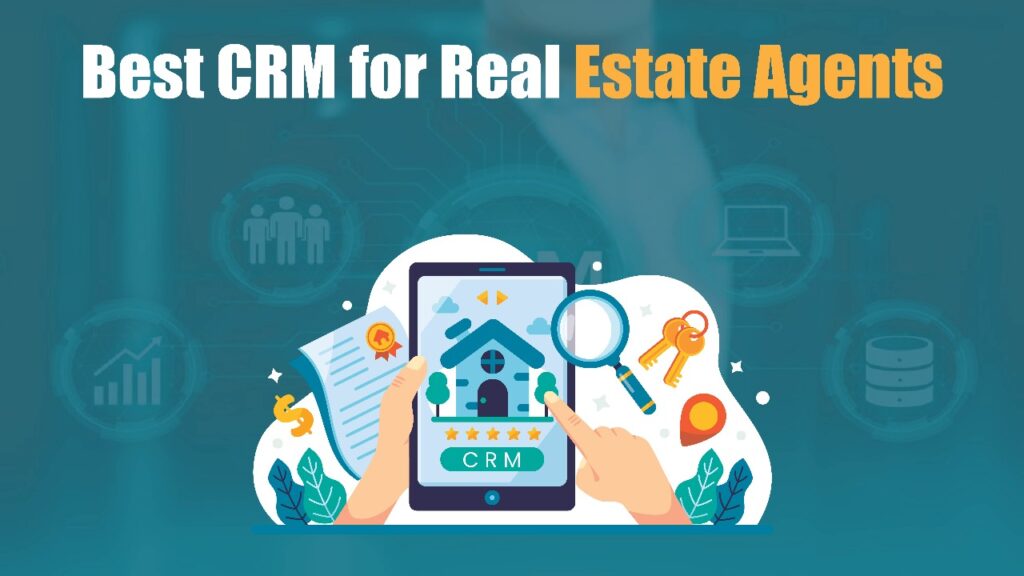If you want to manage listings, track clients, and close deals faster, choosing the right CRM can make your real estate journey far more efficient.
You are at the right place because this guide breaks things down in a simple, practical, and value-packed way. Real estate agents work with tight schedules, multiple property inquiries, and dozens of follow-ups every week, so having a CRM that organizes everything in one place can completely transform your workflow. Sounds good, right?
In this article, you will learn exactly what a real estate CRM is, why it matters, and how it can simplify your daily operations. Instead of juggling contacts, messages, property details, and client needs manually, the right CRM keeps everything organized from first inquiry to final closing. We are on the same boat when we say that time-saving tools truly matter in real estate, so this breakdown will help you confidently choose the CRM that supports your goals.
What is a Real Estate CRM?
A real estate CRM is a software tool that helps agents and agencies manage leads, track clients, store property information, and automate follow-ups. Unlike generic CRMs, these platforms focus specifically on real estate workflows, such as managing listings, scheduling property viewings, and nurturing long-term client relationships. This makes them a practical asset for agents handling multiple deals at once and needing a structured way to stay organized.
These CRMs centralize contact details, communication histories, and client preferences in one place, making it easier to personalize interactions. Many real estate CRMs also integrate with MLS, marketing platforms, and property portals, helping agents manage both sales pipelines and online promotions. Overall, it streamlines the entire sales cycle so agents can spend more time closing deals instead of managing paperwork.
Why Real Estate Agents Need a CRM
A CRM is essential for real estate professionals because it helps reduce workload, speed up follow-ups, and prevent missed opportunities. Real estate leads often come from various sources such as website forms, ads, referrals, and open house sign-ups, and a CRM collects them all automatically. This ensures no potential client slips through the cracks. It also helps maintain consistency, which is crucial in a field where early response times dramatically influence conversion rates.
A CRM helps agents build trust by keeping track of client preferences, budget ranges, home styles, and communication history. With everything organized, agents can personalize their recommendations and offer better property matches. This level of personalization not only improves customer satisfaction but also increases the likelihood of closing more deals in less time.
How a Real Estate CRM Works
A real estate CRM works by collecting client information, organizing it into profiles, and tracking activity throughout the buying or selling journey. When a new inquiry comes in, the CRM instantly logs it, assigns a status, and allows you to set follow-up reminders. It also stores important documents like contracts, agreements, and listing files securely in one place, making them accessible anytime.
Many CRMs also support automation tools, such as automatic responses, drip email campaigns, and appointment scheduling. These features help agents stay active even when they are away from their desks. Over time, the CRM analyzes client behavior and helps agents forecast which leads are most likely to convert, enhancing both efficiency and overall sales strategy.
10 Best CRM for Real Estate Agents
Here are the top solutions real estate professionals rely on.
- Follow Up Boss
- LionDesk
- Zoho CRM for Real Estate
- HubSpot CRM
- Real Geeks CRM
- Pipedrive CRM
- Wise Agent CRM
- Market Leader CRM
- KvCORE Platform
- Chime CRM
1. Follow Up Boss
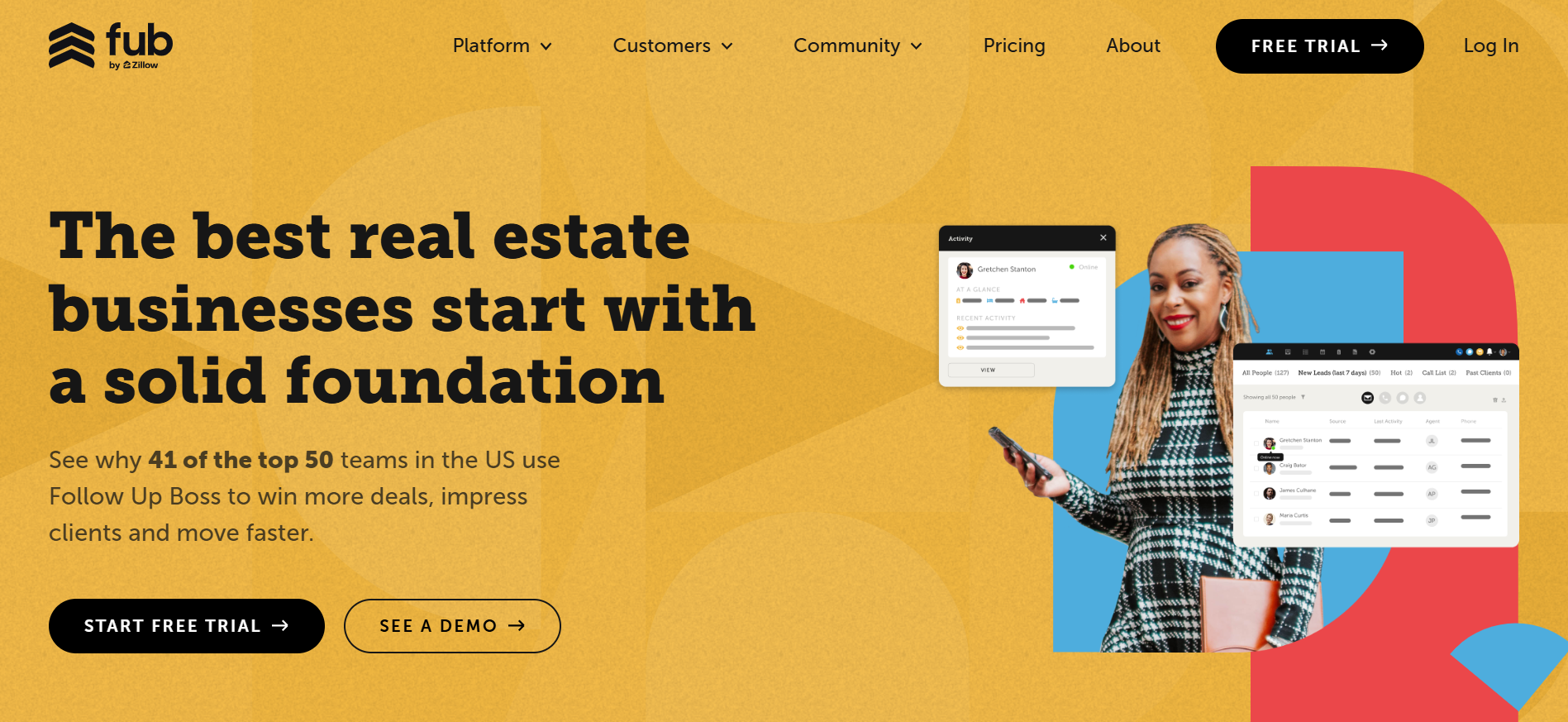
Review
Follow Up Boss is a highly trusted real estate CRM known for its fast lead routing, clean interface, and excellent automation tools designed specifically for property agents and teams. It helps capture leads from multiple platforms instantly and ensures agents follow up at the right time, increasing the chance of conversion. Many real estate teams prefer it because it reduces manual work and makes tracking conversations easier. Overall, it creates a central hub where all client interactions stay organized and accessible.
Features
Pros
- Strong lead routing and quick follow-up workflow
- Powerful integrations with top property platforms
- Easy-to-use interface suitable for both solo agents and large teams
Cons
- Can feel expensive for smaller agents
- Some advanced features require higher-tier plans
Final Verdict
Follow Up Boss is an excellent choice if you want a CRM that improves speed, lead engagement, and overall sales performance. Its real estate-specific tools make it highly effective for agents who handle a large volume of inquiries daily. It is ideal for teams wanting automation and structured client management. If your goal is to convert more leads consistently, this CRM offers dependable support.
2. LionDesk
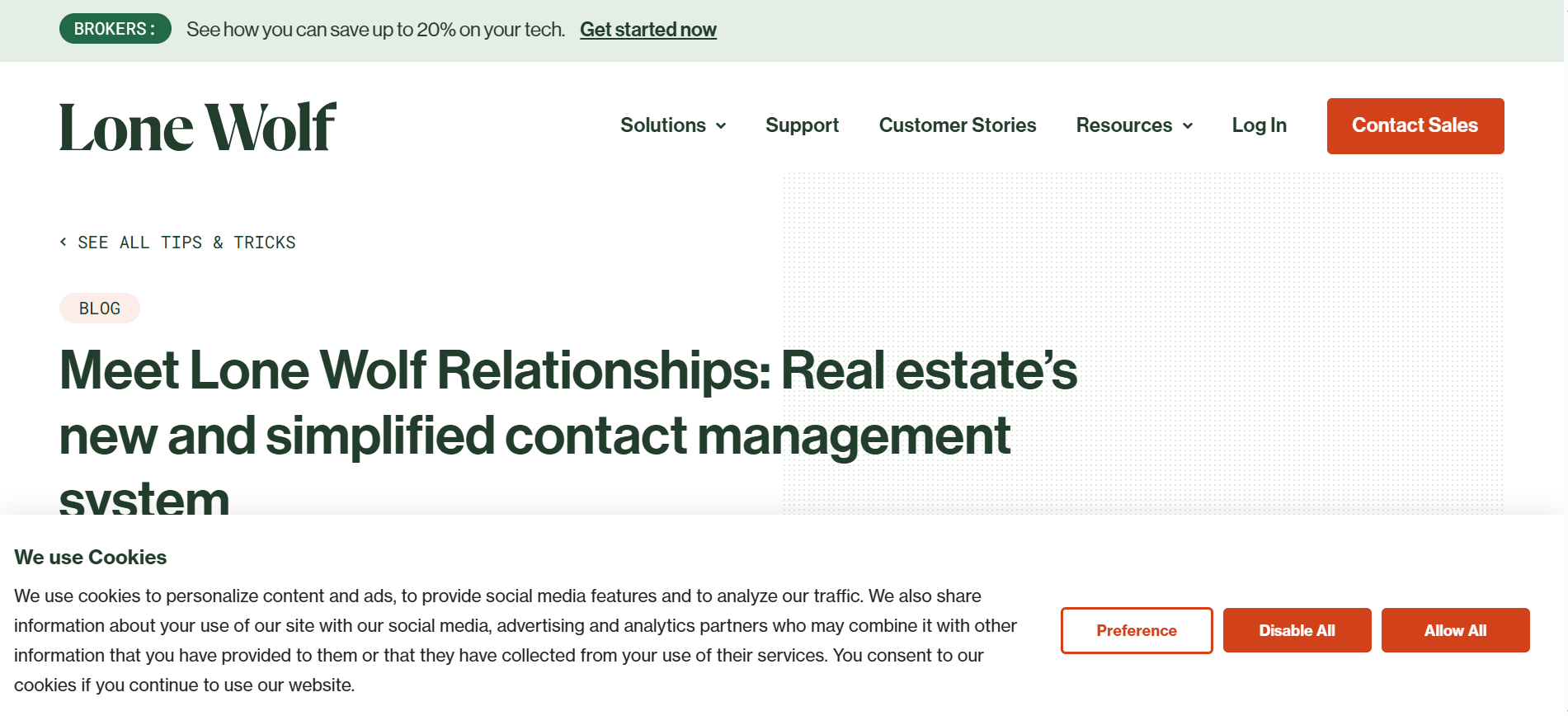
Review
LionDesk is a highly flexible CRM built for real estate agents who need an affordable yet powerful tool for handling client communication. It is widely appreciated for its video messaging capability, making follow-ups more personal. Agents use LionDesk because it simplifies contact management and organizes leads clearly across campaigns. It strikes a great balance between automation and hands-on control, giving agents the freedom to manage clients with precision.
Features
Pros
- Affordable pricing for new agents
- Offers video messaging for better personalization
- Strong automation and campaign tools
Cons
- Interface can feel slightly outdated
- Some integrations require additional setup
Final Verdict
LionDesk is ideal for real estate agents who need automation but want a budget-friendly CRM. The video messaging and drip campaigns make lead nurturing effective and engaging. It is a practical option for agents who want to stay consistent without spending too much. Its communication tools make it one of the best CRMs for building long-term client relationships.
3. Zoho CRM for Real Estate
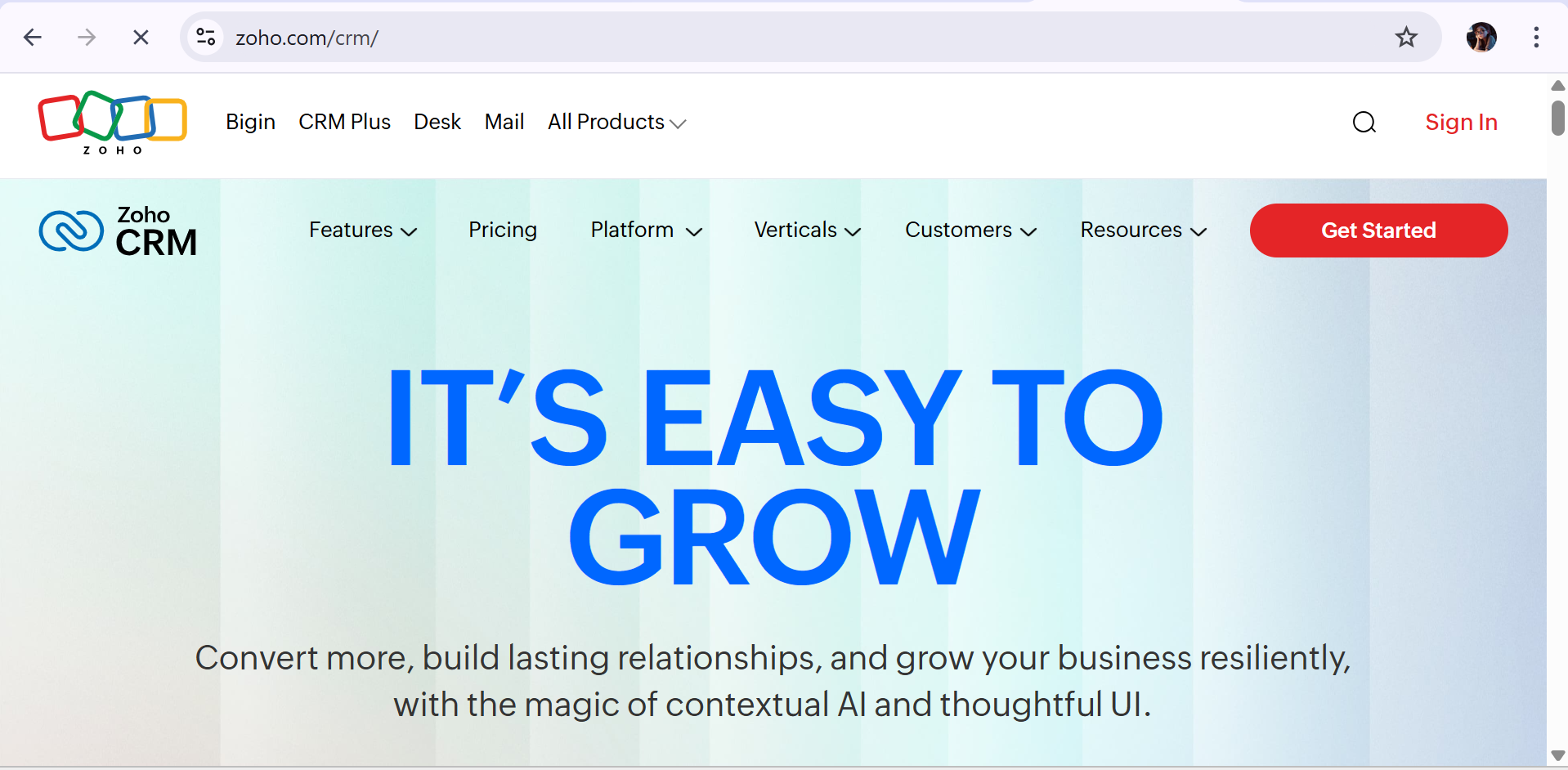
Review
Zoho CRM for Real Estate is a customizable and scalable platform well-suited for agents and agencies looking for strong automation at an affordable cost. It helps manage leads, track property interactions, and create workflows that reduce repetitive tasks. Zoho is known for its versatility and ability to adapt to different client management styles. With deep analytics and smart automation, it helps agents stay organized and proactive in their follow-ups.
Features
- Advanced lead scoring, email automation, and client segmentation.
- AI recommendations and workflow automation for time-saving operations.
- Integrations with MLS, social platforms, accounting, and marketing tools.
- Real estate templates for structured data and faster setup.
Pros
- Highly customizable for any agency size
- Affordable plans with strong automation features
- AI tools improve lead prioritization
Cons
- Can feel overwhelming for beginners
- Some features require customization to unlock full value
Final Verdict
Zoho CRM for Real Estate is a strong choice if you want flexibility and automation without overspending. Its AI-powered features help agents work smarter and target the right clients. It is especially beneficial for teams handling many leads or complex workflows. For agents wanting a long-term scalable solution, Zoho is a dependable option.
4. HubSpot CRM
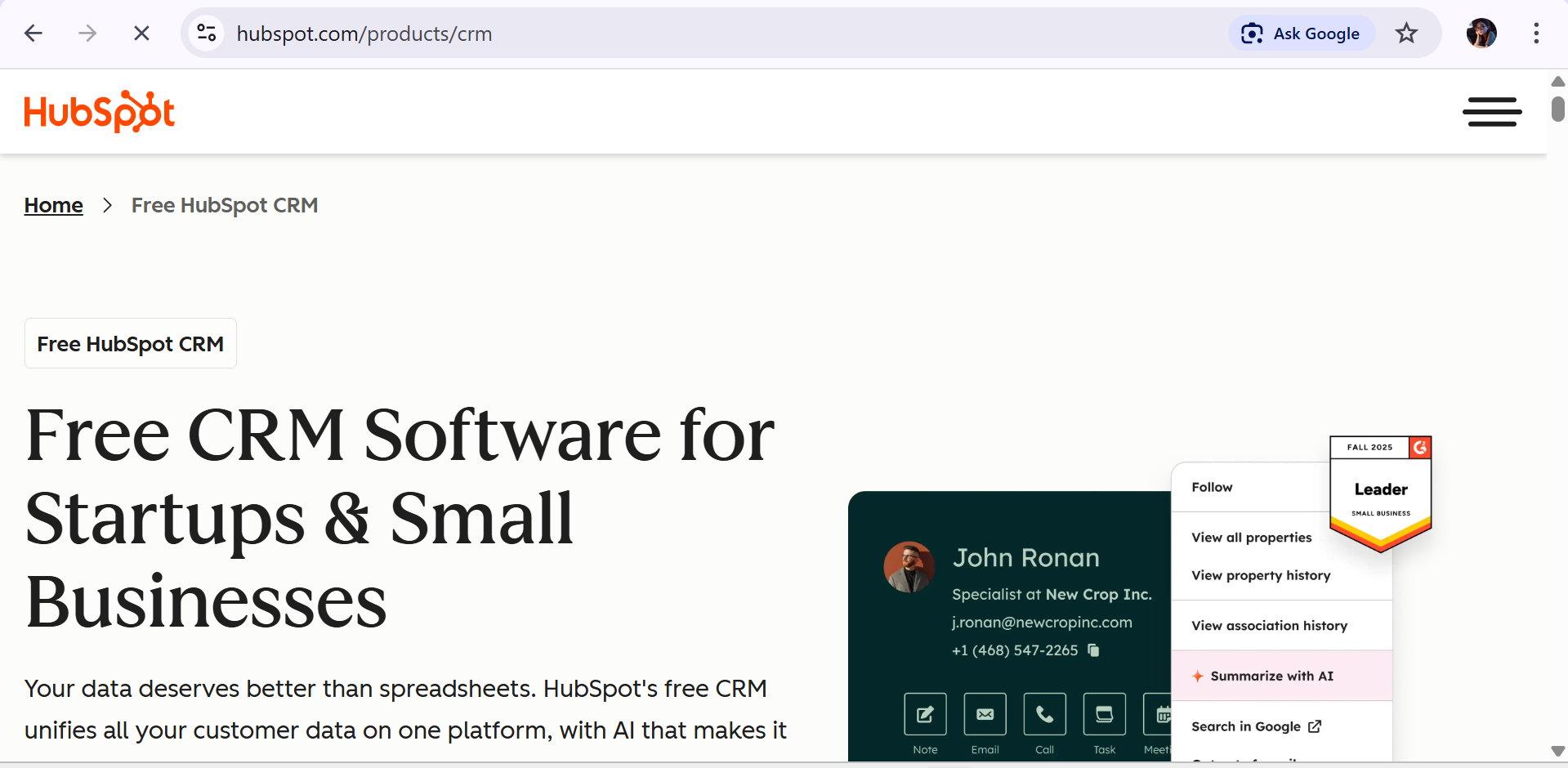
Review
HubSpot CRM is a widely respected real estate tool known for its clean interface, strong marketing features, and a generous free plan. It is perfect for agents who rely on inbound marketing strategies such as content, lead magnets, and online listings. The CRM provides seamless contact organization and ensures every conversation stays recorded and accessible. HubSpot makes it easy to manage pipelines and track progress without unnecessary complexity.
Features
- Email tracking, task automation, and customizable pipelines.
- Lead capture forms, meeting scheduling, and strong analytics.
- Marketing Hub integration for seamless campaigns and lead nurturing.
- Mobile app and centralized communication for real estate workflow
Pros
- Free CRM plan with great value
- Excellent marketing and automation tools
- Clean and beginner-friendly interface
Cons
- Advanced features can get expensive
- Limited customization in the free plan
Final Verdict
HubSpot CRM is ideal for agents who rely heavily on online marketing and want a platform that grows with their business. Its free tools alone offer enough power for many agents starting out. The clean interface and robust marketing features make it a solid all-in-one solution for managing leads and communication.
5. Real Geeks CRM
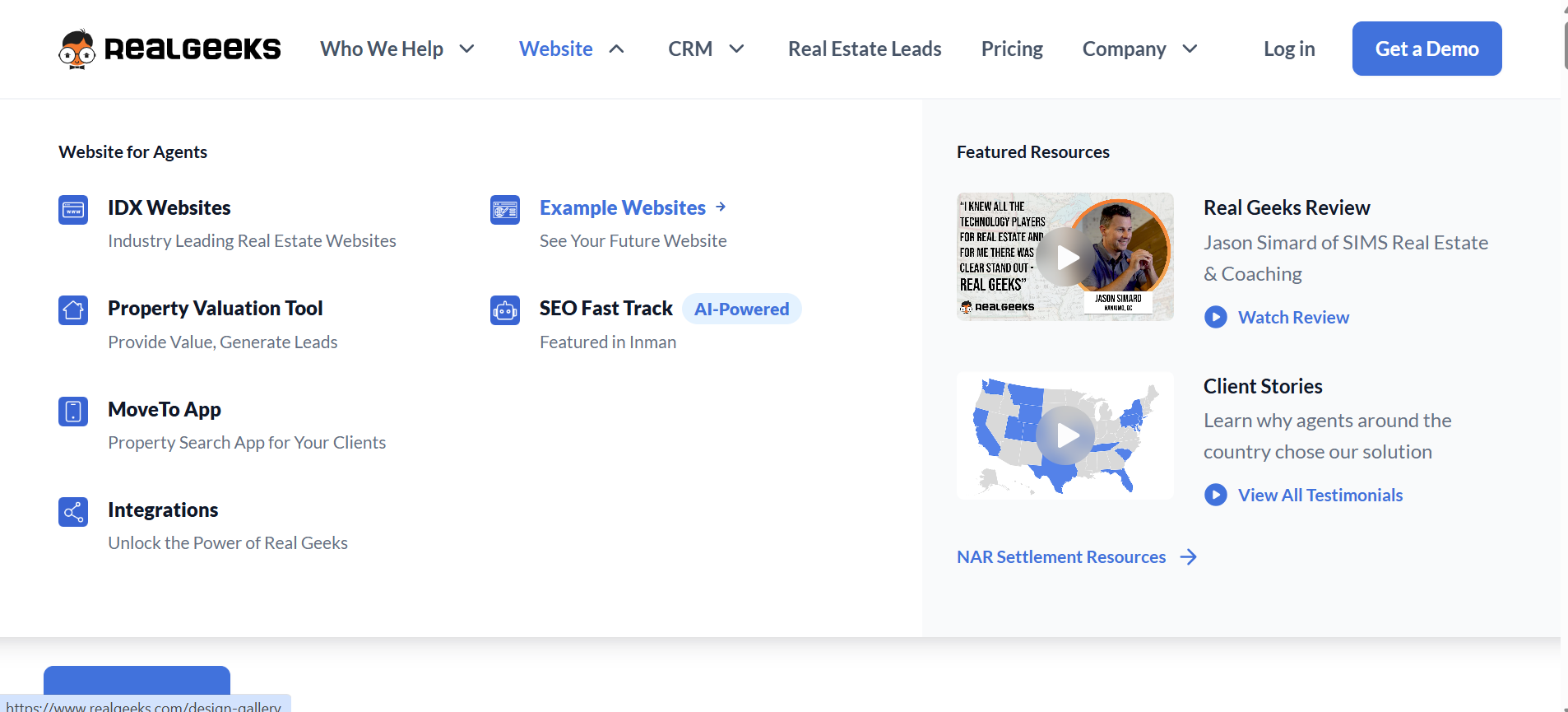
Review
Real Geeks is a real estate CRM built to help agents generate leads, manage pipelines, and close deals efficiently. It stands out for its powerful IDX website integration, which attracts high-quality property leads. Agents appreciate the platform’s ability to capture inquiries quickly and keep communication flowing. Real Geeks simplifies daily work by offering tools that reduce manual input and keep clients engaged.
Features
- Lead capture and automated follow-ups.
- Texting tools and pipeline tracking.
- Marketing tools with analytics.
- MLS integration for real-time updates.
Pros
- IDX websites help generate high-quality leads
- Strong automation and follow-up tools
- Useful for both solo agents and teams
Cons
- Pricing can be higher than basic CRMs
- Interface design could be more modern
Final Verdict
Real Geeks is a powerful tool for agents who want an all-in-one lead generation and CRM platform. Its IDX capabilities and automation tools make it particularly effective for capturing and converting property leads. It is a great option for agents wanting a more advanced system that supports long-term growth.
6. Pipedrive CRM
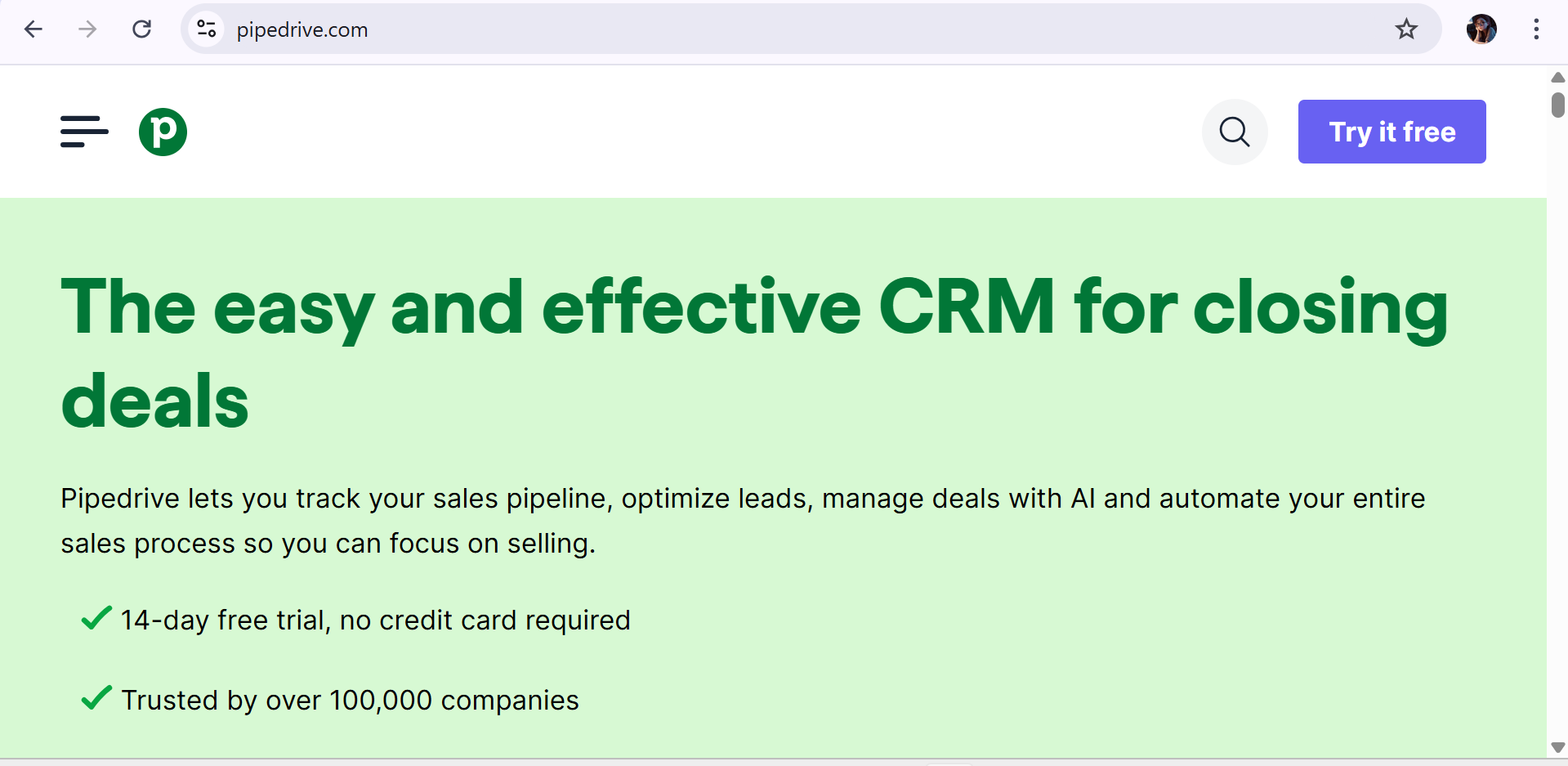
Review
Pipedrive is a sales‑focused CRM built around a visual pipeline that helps sales-driven professionals track deals clearly and efficiently. Its drag‑and‑drop interface lets users move deals across stages, while built-in automations cut down on repetitive work like follow-ups and status updates. An AI Sales Assistant provides suggestions like next actions and deal insights. Pipedrive also integrates with hundreds of third-party tools, giving flexibility across email, accounting, and task‑management systems.
Features
- Visual sales pipeline with customizable stages
- Workflow automation builder
- Email integration, tracking, and templates
- Activity / task management with reminders
- Reporting and sales forecasting
- AI Sales Assistant for insights and deal scoring
- Over 300+ integrations (Zapier, QuickBooks, etc.)
- Mobile app for iOS & Android
Pros
- Intuitive, clean pipeline visualization
- Automation reduces admin burden significantly
- Strong integration ecosystem
- AI-powered insights help prioritize deals
- Mobile access keeps deal management on the go
Cons
- Limited marketing automation
- Reporting/custom dashboards are less powerful on lower-tier plans
- No free permanent plan; only a trial
- Advanced automation/customization requires higher pricing tier
Final Verdict
Pipedrive CRM is a strong choice for sales-focused individuals or small to mid-sized teams who want a clean, visual, and highly functional pipeline system. Its automation and AI features help streamline deal management, and its integration capabilities let you connect with your existing tools easily.
7. Wise Agent CRM
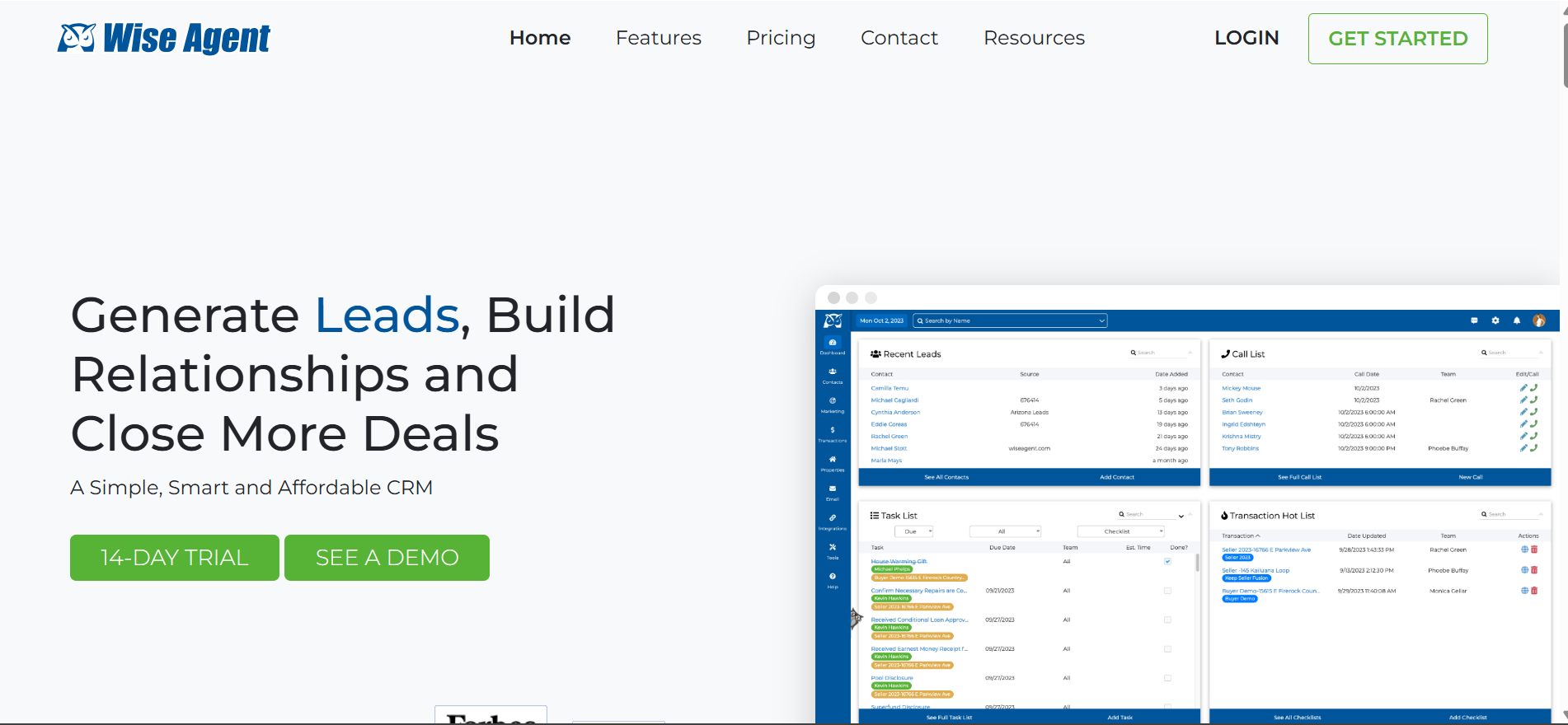
Review
Wise Agent is a CRM tailored for real estate professionals, especially agents who want to manage contacts, transactions, and marketing in a single system. It provides a centralized dashboard for client data, integrates transaction checklists, and supports drip marketing campaigns. Wise Agent also offers lead automation, landing page creation, and document storage. Its pricing is relatively affordable compared to many real estate-specific CRMs, making it popular among solo agents and small teams.
Features
- Contact management with detailed profiles
- Transaction management and checklists
- Drip email campaign builder
- Landing page builder for lead capture
- Unlimited document storage
- Reporting and performance dashboards
- 100+ integrations with real estate and productivity tools
Pros
- Very affordable for real estate professionals
- Includes transaction-management workflows
- Good lead automation & drip marketing functionality
- Strong customer support and onboarding
- Unlimited storage for documents and client files
Cons
- Texting via the platform costs extra
- Interface can feel a little dated
- Some real estate marketers may want more advanced campaign features
Final Verdict
Wise Agent CRM is ideal for real estate agents who need a cost-effective, all-in-one CRM that covers contacts, transactions, and lead nurturing. Its affordability and strong real estate-specific workflows make it a practical choice.
8. Market Leader CRM
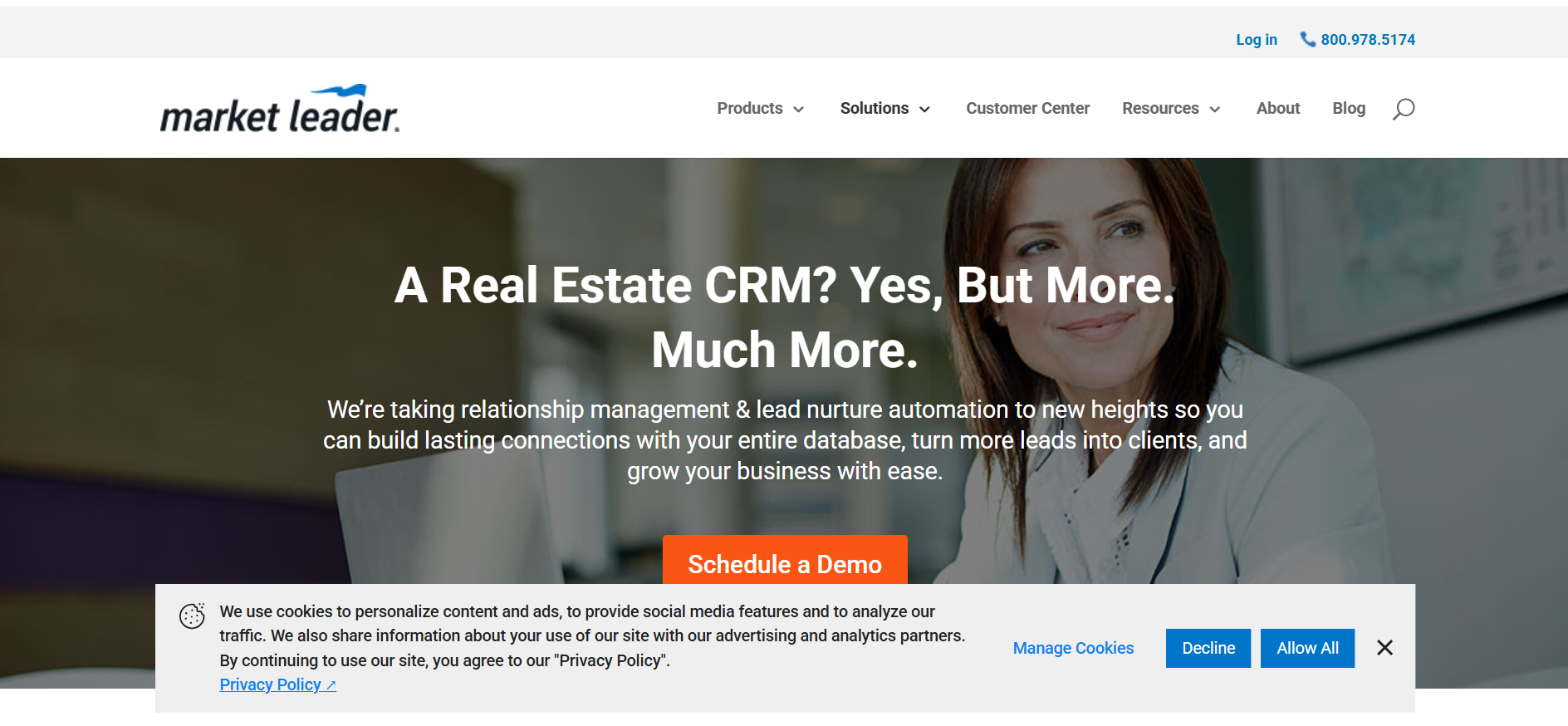
Review
Market Leader CRM is a real estate–oriented CRM that combines contact management, automated marketing, and lead generation. It integrates with major listing platforms and provides a website builder that allows agents to capture leads directly from property search pages. The CRM also sends automated alerts to contacts about new listings, and its marketing system includes automated emails, texts, and listing notifications.
Features
- Lead source integration from multiple listing platforms
- IDX-enabled website builder for real estate
- Automated email and text alerts for listings
- CRM dashboard to track contact activity and property searches
- Mobile app for on-the-go CRM access
- Business planning resources (scripts, templates) included
Pros
- Easy to set up and use, especially for new agents
- Strong lead generation via listing portals
- Automated follow-up and marketing built-in
- Good contact and lead categorization via tags and activity
- IDX website helps build web presence and capture leads
Cons
- Lead quality can deteriorate; some users report poor conversion
- Limited automatic nurturing features compared to modern marketing CRMs
- Not very robust for high-volume workflows
- Support for advanced customization is limited
Final Verdict
Market Leader CRM is a solid choice for real estate agents who want a simple, integrated solution for capturing leads, managing contacts, and sending automated listing alerts. Its strength lies in its real estate integrations and lead generation tools.
9. kvCORE Platform
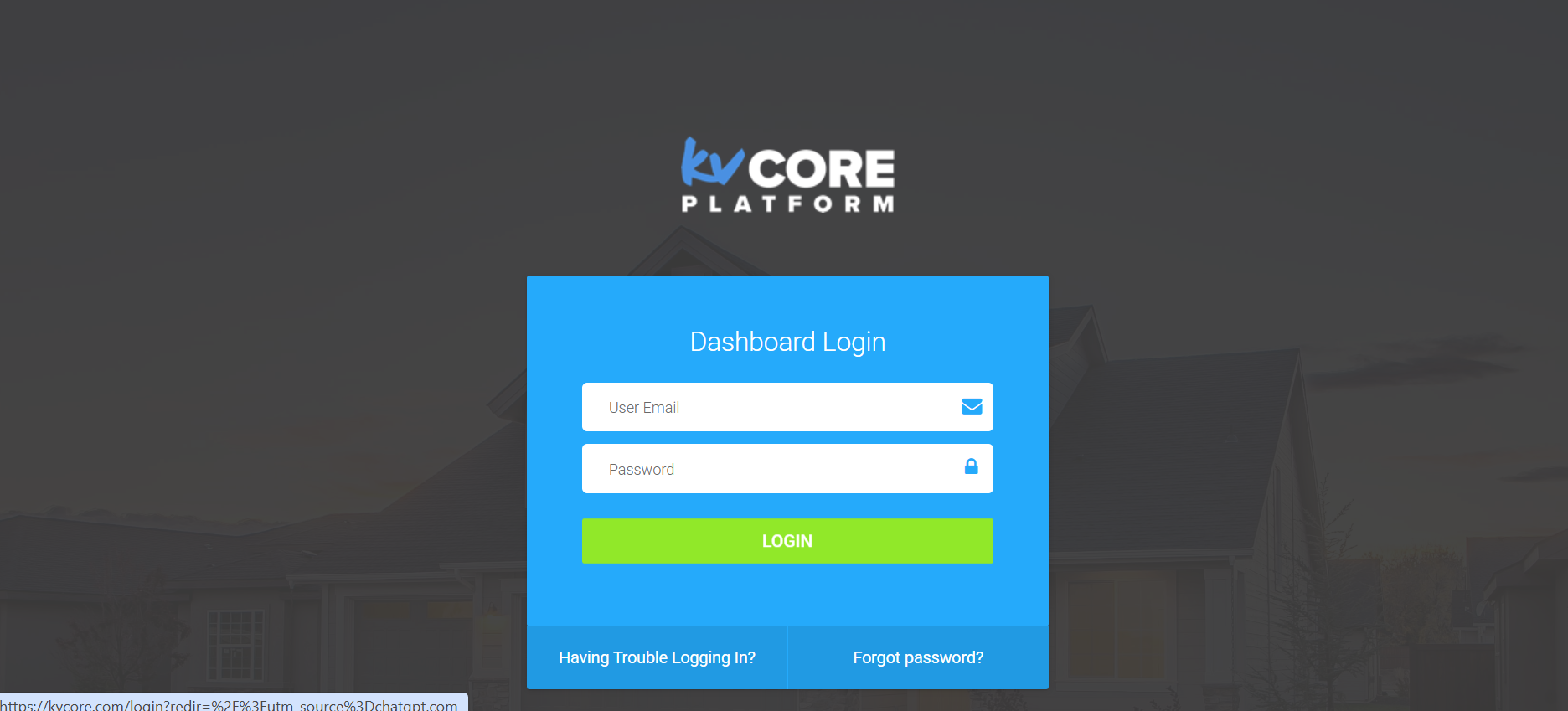
Review
kvCORE is a powerful, all-in-one real estate CRM platform tailored for brokerages, teams, and high-volume agents. It combines website building (IDX), lead capture, automated marketing, and CRM in a single system. Agents can create drip campaigns, run email and text nurture sequences, and get behavioral insights on leads. The platform also provides team-level automation, lead routing, and performance analytics.
Features
- IDX-enabled websites for lead capture
- AI-driven Smart CRM for lead prioritization and nurture
- Email & SMS campaign builder with automation
- Lead routing and distribution for teams
- Built-in mobile dialer for calls and texts
- Reporting and analytics dashboards
- Integrations with transaction tools
Pros
- Very comprehensive: website, CRM, and marketing in one platform
- Scalable for teams, brokerages, or solo agents alike
- AI automation helps prioritize and nurture leads efficiently
- High lead capture potential with IDX integration
- Good mobile functionality for calls and texts on the go
Cons
- Steep learning curve due to rich feature set
- High cost relative to simpler CRMs
- Some users report bugs or slow UI
- Lead routing and campaign setup can be complex
Final Verdict
kvCORE is one of the most powerful CRMs for real estate professionals who want a truly integrated platform. Its website + lead capture + CRM + automation capabilities make it a very attractive choice for high-volume agents or brokerages.
10. Chime CRM
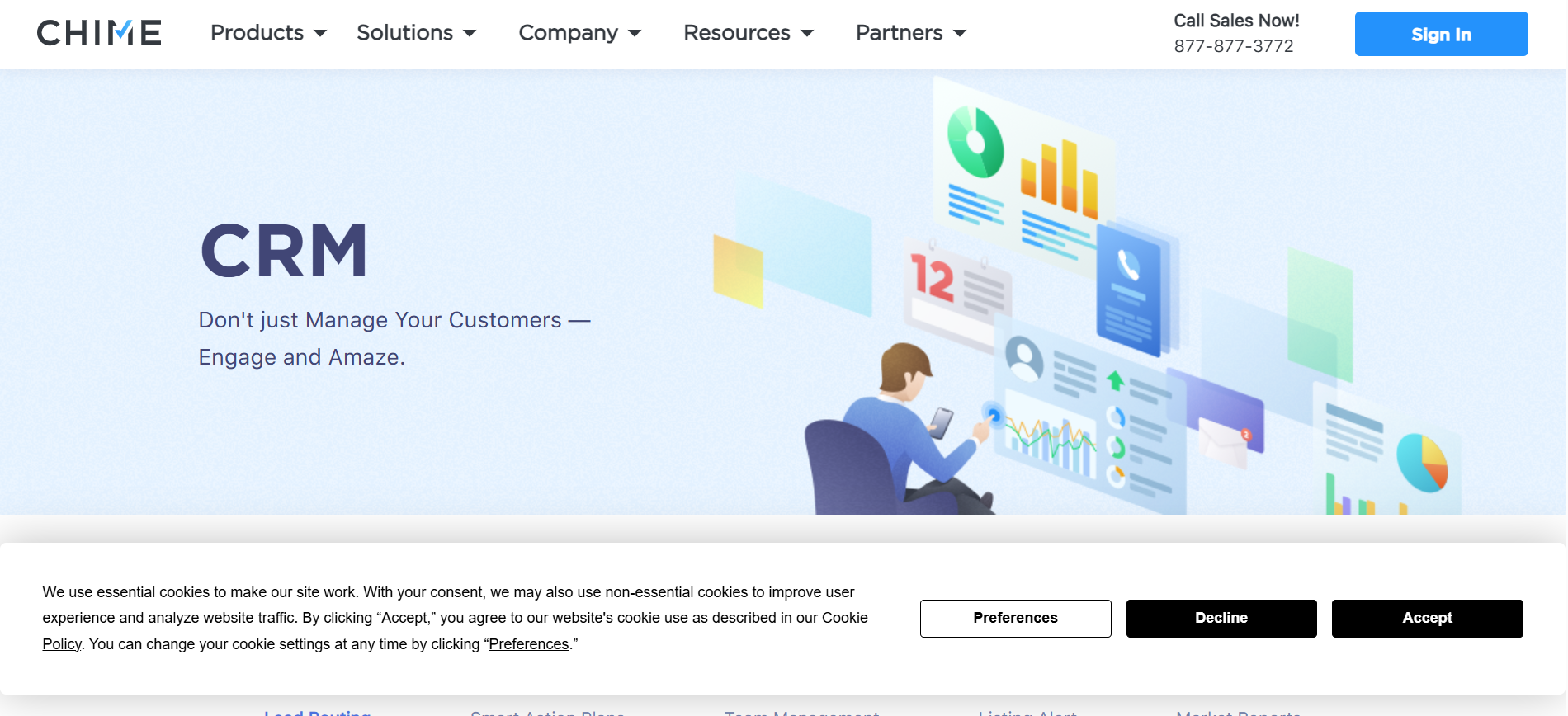
Review
Chime CRM is a real estate–specific platform that combines lead generation, IDX website building, automated marketing, and lead management. It supports automated workflows called “Smart Plans” that trigger outreach via email, call, and SMS based on lead behavior. It also provides a power-dialer for calls, AI-driven lead recommendations, and a mobile app to help agents stay connected.
Features
- IDX website builder for real estate lead capture
- Smart Plans: automated workflows (email, SMS, call)
- Power Dialer for calling with pre-scripted voicemails
- Lead routing based on geography, source, or tags
- Automated lead nurturing and alerts
- Mobile app for full CRM access and calling
- Integrations with Gmail, MLS platforms, and transaction tools
Pros
- Strong lead generation + CRM combination
- Smart Plans automate personalized follow-up
- Power Dialer improves calling efficiency
- AI-driven lead scoring and recommendations
- Highly mobile agents can work from anywhere
Cons
- Learning curve can be steep for non-technical users
- Lead generation tools may not always produce high-quality leads
- Less flexible reporting/custom reporting
- Some users report limited integration options compared to open CRMs
Final Verdict
Chime CRM is a strong, all-in-one real estate CRM for agents or small brokerages who need lead generation, automation, and calling in a single platform. Its Smart Plans and dialer give it a powerful edge in follow-up and outreach.
Conclusion
Choosing the best CRM for real estate agents becomes much easier when you know exactly what features matter most for your workflow. The right CRM helps organize leads, automate follow-ups, and manage listings with confidence. Real estate work requires fast communication, strong relationships, and consistent tracking, and a well-chosen CRM ensures you never miss important opportunities. Whether you’re a solo agent or part of a large team, each CRM on this list offers structured tools to help you perform better and close more deals.
As the real estate market becomes increasingly competitive, having an efficient CRM is no longer optional—it is essential for staying ahead. With automation, analytics, and lead management working together, you can focus more on clients and less on admin work. Select the CRM that aligns best with your goals, and you will see the difference in productivity and results.
Frequently Asked Questions (FAQs)
What features should a real estate CRM have?
A good real estate CRM should include lead management, automated follow-ups, pipeline tracking, MLS integration, task reminders, and strong communication tools. These features help agents manage clients through every stage of the buying or selling journey.
Is a real estate CRM necessary for new agents?
Yes, new agents benefit greatly from a CRM because it helps them stay organized from the start. It ensures they manage leads properly, follow up on time, and build a structured sales routine that supports long-term success.
Which CRM is best for real estate teams?
CRMs like Follow Up Boss, Real Geeks, and LionDesk are excellent for teams because they offer lead routing, task assignment, collaboration tools, and detailed reporting. These features help teams work more efficiently and avoid overlap.
Are free CRMs good for real estate agents?
Free CRMs like HubSpot can work well for agents starting out, especially if they want basic tools for lead tracking and communication. As business grows, many agents later upgrade to paid plans with more automation.
How do I choose the right real estate CRM?
Identify your needs first whether you want automation, marketing tools, MLS integration, or budget-friendly pricing. Compare the features of each CRM and choose the one that aligns with your workflow and long-term goals.
